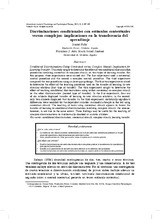Discriminaciones condicionales con estímulos contextuales versus complejos: implicaciones en la transferencia del aprendizaje
Autor
Falla, Daniel
Alós Cívico, Francisco
Jiménez, María Salud
Editor
Universidad de AlmeríaFecha
2015Materia
Conditional discriminationContextual stimuli
Complex stimuli
Learning transfer
METS:
Mostrar el registro METSPREMIS:
Mostrar el registro PREMISMetadatos
Mostrar el registro completo del ítemResumen
This study sought to determine the effect of two conditional discrimination
procedures involving contextual vs complex stimuli, on two types of learning transfer. For
this purpose, three experiments were carried out. The first experiment used a contextual
control procedure and the second a complex control procedure. The third experiment
compared the two procedures using an inter-group design. The first two experiments aimed
to determine the effect of the teaching procedure used on the transfer of learning to new
stimulus relations (first type of transfer). The third experiment sought to determine the
effect of teaching conditional discriminations using wither contextual or complex stimuli
on the other discrimination (second type of transfer). In the first experiment, four out
of six subjects displayed transfer of learning to new stimulus relations; in the second,
only two subjects displayed that transfer. In the third experiment, statistically-significant
differences were recorded for the dependent variable: successful attempts in the test using
contextual stimuli. The teaching of tasks using contextual stimuli appears to favour the
transfer of learning to conditional discriminations involving complex stimuli; the reverse,
however, is not true to the same extent. These findings may be useful for the teaching of
complex discriminations to intellectually-disabled or autistic children.

